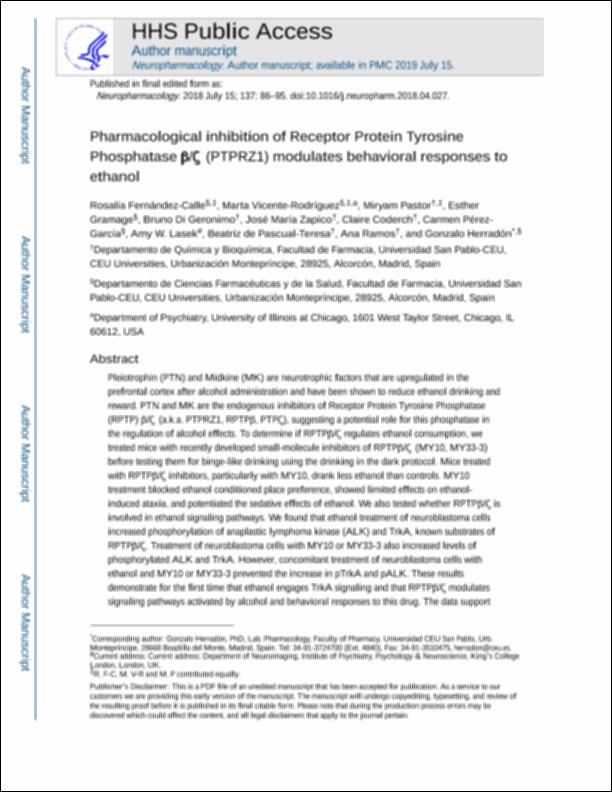Please use this identifier to cite or link to this item:
http://hdl.handle.net/10637/15216Pharmacological inhibition of Receptor Protein Tyrosine Phosphatase β/ζ (PTPRZ1) modulates behavioral responses to ethanol
| Title: | Pharmacological inhibition of Receptor Protein Tyrosine Phosphatase β/ζ (PTPRZ1) modulates behavioral responses to ethanol |
| Authors : | Fernández Calle, Rosalía Vicente Rodríguez, Marta Pastor, Myriam Gramage, Esther Di Geronimo Quintero, Bruno Zapico Rodríguez, José María Coderch Boué, Claire Pérez García, Carmen Lasek, Amy W. Pascual-Teresa Fernández, Beatriz de Herradón Gil-Gallardo, Gonzalo |
| Keywords: | ALK; TrkA; Alcohol use disorder; Binge-drinking; Pleiotrophin; Midkine |
| Publisher: | Elsevier |
| Citation: | Fernández-Calle R, Vicente-Rodríguez M, Pastor M, Gramage E, Di Geronimo B, Zapico JM, et al. Pharmacological inhibition of Receptor Protein Tyrosine Phosphatase β/ζ (PTPRZ1) modulates behavioral responses to ethanol. Vol. 137, Neuropharmacology. 2018. p. 86-95. |
| Abstract: | Pleiotrophin (PTN) and Midkine (MK) are neurotrophic factors that are upregulated in the prefrontal cortex after alcohol administration and have been shown to reduce ethanol drinking and reward. PTN and MK are the endogenous inhibitors of Receptor Protein Tyrosine Phosphatase (RPTP) β/ζ (a.k.a. PTPRZ1, RPTPβ, PTPζ), suggesting a potential role for this phosphatase in the regulation of alcohol effects. To determine if RPTPβ/ζ regulates ethanol consumption, we treated mice with recently developed small-molecule inhibitors of RPTPβ/ζ (MY10, MY33-3) before testing them for binge-like drinking using the drinking in the dark protocol. Mice treated with RPTPβ/ζ inhibitors, particularly with MY10, drank less ethanol than controls. MY10 treatment blocked ethanol conditioned place preference, showed limited effects on ethanol-induced ataxia, and potentiated the sedative effects of ethanol. We also tested whether RPTPβ/ζ is involved in ethanol signaling pathways. We found that ethanol treatment of neuroblastoma cells increased phosphorylation of anaplastic lymphoma kinase (ALK) and TrkA, known substrates of RPTPβ/ζ. Treatment of neuroblastoma cells with MY10 or MY33-3 also increased levels of phosphorylated ALK and TrkA. However, concomitant treatment of neuroblastoma cells with ethanol and MY10 or MY33-3 prevented the increase in pTrkA and pALK. These results demonstrate for the first time that ethanol engages TrkA signaling and that RPTPβ/ζ modulates signaling pathways activated by alcohol and behavioral responses to this drug. The data support the hypothesis that RPTPβ/ζ might be a novel target of pharmacotherapy for reducing excessive alcohol consumption. |
| URI: | http://hdl.handle.net/10637/15216 |
| Rights : | http://creativecommons.org/licenses/by/4.0/deed.es |
| ISSN: | 0028-3908 |
| Issue Date: | 15-Jul-2018 |
| Center : | Universidad San Pablo-CEU |
| Appears in Collections: | Facultad de Farmacia |
Items in DSpace are protected by copyright, with all rights reserved, unless otherwise indicated.


